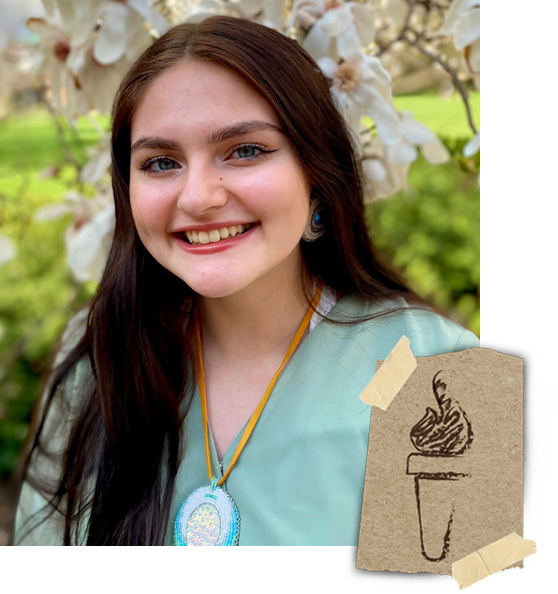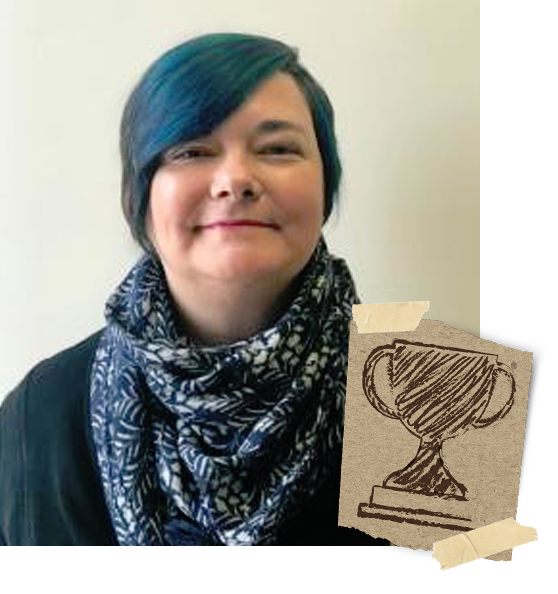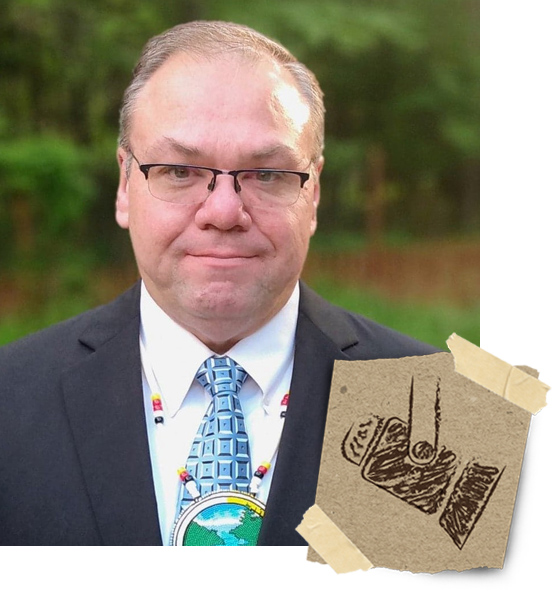Diversity Torch: Roxy Mashkawiziikwe Sprowl
November 15, 2021 - Liz Schondelmayer
 Roxy Mashkawiziikwe Sprowl ( she/they ) is a sophomore in the Michigan State University College of Social Science majoring in Social Work with a minor in Indigenous Studies in Law, Justice and Public Policy.
Roxy Mashkawiziikwe Sprowl ( she/they ) is a sophomore in the Michigan State University College of Social Science majoring in Social Work with a minor in Indigenous Studies in Law, Justice and Public Policy.
A citizen of the Red Cliff Band of Lake Superior Ojibwe, Roxy is a committed student-activist and a member of the Social Science Scholars Program, the Bridge Scholars and the North American Indigenous Student Organization (NAISO). Her goals both personally and professionally revolve around promoting equity and inclusion for Indigenous peoples and other people of color like herself.
In their native language, Roxy introduces themselves using the following greeting:
Boozhoo! Bezhigonoodinkwe nindizhinikaaz. Marquette, MI nindoonjibaa. Migizi nindoodem. Miskwaabekong Ojibwekwe nindaaw.
Translation: Hello, my name is First Wind Woman ( Roxy's Ojibwe name ). I am Eagle Clan. I'm from Marquette, Michigan, but I am a citizen of the Red Cliff Band of Lake Superior Ojibwe, which is based out of northern Wisconsin.
Learning her native language was an important aspect of Roxy's decolonization process, which is a journey that many Indigenous people take when reconnecting with their tribal heritage. Below, she discusses the importance of understanding her identity for her mental, emotional and spiritual health.
Everyone has their own reclaiming journey surrounding how they take back their identity as an Indigenous people but for me, it was and is important to learn my Anishinaabe name, clan, and start learning Ojibwe language. I grew up disconnected from my tribal community and reservation after I was placed with my non-Native family through the Indian Child Welfare Act. When I was ready to begin reclaiming my identity, I talked with local community members, healers, and some of my family members for guidance. Growing up disconnected from a piece of your identity can be extremely challenging. However, reconnecting with my community members, my ancestral lands, my language, and my own self has helped immensely. One’s reclamation and reconnecting journey is never ending, we are always learning -the start of doing so is incredibly important.
Roxy's decolonization process has also helped them find their passion in the classroom. Within the Social Science Scholars Program, Roxy is currently leading a research lab focused on analyzing how people of color have been portrayed in American high school history textbooks.
I'm currently leading a research project that is focused on exploring how people of color are represented in popular American history textbooks for high schools. This project is really grounded in racial reconciliation efforts, and the hope is that it will show the importance of teaching American history accurately.
To do this, we've taken a few different avenues. The former project lead, Erykah Benson, focused on analyzing the text and visuals included in the books, and we've built on that by comparing numerically how often people of color are represented in certain textbooks, versus what percent of the population specific groups actually account for. This year through primarily visual analysis, we are taking a deep dive into how frequently these representations are racial caricatures, and if the publishers of the book acknowledge those portrayals as stereotypes.
This project is personally important to me because I grew up disconnected from my tribal community, and so it was damaging to me to not have an opportunity in school to learn any of my history. While I was learning my history through my family, what I was learning in school did not line up, triggering intergenerational trauma.
Outside of the classroom, Roxy continues to educate others about her indigenous community and identity by serving as the public relations representative for NAISO .
NAISO is an organization for Indigenous-identifying undergraduate students on campus to feel a sense of community, engage in cultural activities, and have a shared sense of space on campus.
I joined this organization my freshman year, because I knew that it was going to be important for me to have a sense of community on campus. Since then, it's been a lot of fun, and I've really enjoyed creating all of the outreach flyers and social media posts to connect people to our organization. We host several events, such as film viewings, craft workshops, and an annual Powwow of Love, and they are open to students who want to learn more about our cultures.
As an Indigenous college student at a predominantly-white university, Roxy has encountered the assumption that they and all other Indegenous students automatically get "free college." But that couldn't be further from the truth, and Roxy explains why below.
One really harmful misconception people have about Indigenous people is that we get free college automatically because we're Native. In my case, I do attend college for free - but that is due to a scholarship I received completely unrelated to my Indigenous identity or heritage. And while some Indigenous students do qualify for The Michigan Indian Tuition Waiver, they have to be a part of a federally-recognized tribe (which is problematic because there are many tribes that exist but remain unrecognized at this level) and have at least one quarter blood quantum (which is a metric that is deeply rooted in genocidal policies towards Indigenous peoples).
This assumption that we all go to college for free really needs to be reframed, because not only is it untrue, but it glosses over the fact that colonizers and settler colonialists tried to expel Indigenous people off from our own ancestral lands, where these universities are now built, and at the time, we couldn't even attend these institutions. It's been less than 100 years since we could even be considered citizens in this country. It's a necessary form of reparations, especially when Indigenous youth comprise some of the lowest high school graduation statistics in the country
Finally, Roxy shares some ways that each of us can change the way we discuss indigenous peoples, histories and heritages to be more inclusive and culturally-informed.
It is important to understand that language has a lot of power. And while other Indigenous people are totally fine to have different opinions on this, I prefer to avoid using the phrases "Native American" or "American Indian." We are not “Indians” and the term “America” arose post-European Invasion, during colonization. That is why I prefer to say "Indigenous," and why when I refer to myself, I say “Ojibwe” or “Anishinaabe”.
It is also important to say Indigenous peoples instead of "people," because we are not a monolith. There are 574 federally-recognized tribes in the United States, many more that are recognized only at the state level, and then even more that are not recognized by federal or state governments at all. We all have some things in common due to our shared experiences as Indigenous peoples, but we also have our own distinctive traditions, languages and cultures.
Language and culture are intertwined. You cannot have one without the other. It is necessary to acknowledge how language can shape culture. When one is excluded from the language, it excludes them from culture. When language is inaccurate, it leads to misconceptions. In order to counter these misconceptions in mainstream society and increase our visibility as Indigenous peoples, we need to make space for inclusive language and accurate representations. We are still here.
Read more:

Diversity Champion
Faculty/Staff
Dr. Heather Howard
Dr. Heather Howard, an MSU Anthropology associate professor has dedicated her career to promoting our understanding of Native American heritage, through community engaged research.

Diversity Spotlight
Alumni
Jason Cross
Jason Cross, an enrolled citizen of the Little River Band of Ottawa Indians, is an MSU School of Social Work alumnus. An award-winning children’s advocate, Cross has a wealth of experience in the tribal government sector. He is presently the State Manager of Indian Child Welfare Act (ICWA) Compliance and Race Equity.

Diversity Matters
We strive to cultivate an inclusive and welcoming college environment that celebrates a diversity of people, ideas, and perspectives.

